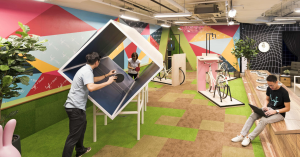You may have heard of it before, maybe you are even thinking of working from home in the near future, but where did it come from, and what can coworking, remote working, and community living offer the young professionals of today? We’ll take a deep dive into the history of remote working to better understand the rise of coworking.
Many wouldn’t have expected it, but the remote working phenomenon can be dated back to 1979 when five employees of a company were allowed to work from home as an experiment. Only 4 years later, that amount grew to 2000 employees. JC Penny gave its call center staff the option to work from home. The idea of remote work began to grow and was the perfect solution for startups around 1999. How could a starting business with a limited budget hire more employees and branch out without having the money to rent an office, buy supplies or set up an administration? On top of that, the environmental benefits were starting to show clearly. With lesser people on the road, air and noise pollution lowered as well. Software brand Getapp states the number of people working from home has risen by 400% since 2010, with 78% of respondents working remotely some of the time.
Coworking explained
Generally speaking, the definition of coworking is when people assemble in a neutral space to work independently on different projects or in groups on the same projects. The people in a coworking space aren’t working for the same company. The biggest benefit is flexibility, you don’t have to pay rent or sign a lease. A beneficial factor are the amenities as everything you need is there; wifi, printers, pens, paper, coffee (a must!) and dedicated conference rooms are available. But the one thing making a coworking space so great is the community. In places with regulars and familiar faces, it’s amazing how far above and beyond the community will go to help one another succeed. And on top of that, you will find the energy of productivity in the air, which will motivate you to keep working as well.
Now looking at the beginnings of coworking, the use of an office or working environment by self-employed people or those working for different employers remotely, we’d have to go all the way back to 1995. C-base, founded in Berlin, was a hackerspace. A few years later, in 1999, 42 West 24 arrived in New York City, with flexible desks for teams and individuals. These were precursors to coworking spaces, excluding the crucial aspect of community that coworking offers now. However, Brad Neuberg was the true pioneer in coworking as he started a coworking space in 2005.
“He wanted to find a way to combine the feeling of independence and freedom of working by himself with the community feel and structure of working with others”. – Coworking resources.

2005 was paramount in the history of coworking, with the arrival of more independent spaces that latched on to the concept. For example, the very first Hub opened at the Angel Station in London, which has since become a huge franchise network. Additionally, St. Oberholz in Germany opened that year as one of the very first cafes that had free internet access. By 2012, there were over 2,000 spaces in the world. As of 2021, there are dozens of major coworking space companies around the world, including franchises with branches in multiple cities.
The improvement in productivity

Coworking people feel part of a community. Every community has its own vibe, and you can always find a coworking space with the community that works for you! May it be a surfing group, musically talented people, or simply people who have the same interest in traveling and culture as you do. If you have a busy day and want to focus, then you can just pull back, put on your headphones, and get to work. We have made a list of the benefits;
1.The environment
Research and experiments have proven that people feel better when surrounded by a flexible and less formal environment. If you are mentally satisfied and feel safe, then you’ll find to be able to perform better.
2. Networking
Coworking spaces allow you to meet new people and establish a network with ones that fit your personality and work ethic. You won’t feel forced to create a working relationship with colleagues you don’t necessarily like and surround yourself, which can result in the form of lack of motivation, stress, and depression. You engage with only the peopleyou believe are significant to you.
3. Diversity
In the shared workspace environment, you’ll have the opportunity to meet all kinds of people from different professions and backgrounds. In such a diverse environment, which brings all like-minded people to one place with a common goal, to have an environment of collaboration with no competition since you are not working for the same company and have to outperform your colleagues.
4. Flexibility
Renting an office space can be very costly for a small business owner or remote worker. All though, we do need a space outside our homes sometimes to work more productively and with fewer distractions. Therefore memberships can be affordable, and if your lifestyle changes, you can easily sign off of the coworking program.
What people say about coworking

Between 75% and 90% of millennials love the personal connection that coworking creates, as they feel more engaged and motivated to work. The positivity sparked by the personal connection makes coworking the key to employee happiness which consequently boosts productivity. So, no more procrastination, which we all know everyone struggles with.
Did you know that people who are working in a coworking space score 6 points on a 7-point productivity scale? That’s amazing! Now you are probably asking yourself, how can coworking spaces increase productivity compared to offices while in both situations involve you working around others?
Well, people who use coworking spaces see their work as more meaningful, and that is because of three reasons:
- People working in a coworking space feel like they do not have to put up a working persona. You can sit the way you want, listen to music, take some short breaks without feeling like a bad employee.
- Coworking spaces have a culture where everyone helps each other out.
- Coworking spaces are not just places where you can work but also promotes values such as community, collaboration, learning, and sustainability.
The future of coworking
It is expected that even after the pandemic ends, more professions will partake in the remote working trend. As technology is growing, working from home is becoming more and more realistic. Keep in mind that teams stay visible and accountable from the moment they log in to the moment they log out. In fact, rapid growth has continued so much that the number of coworking spaces worldwide is projected to reach over 40,000 in 2024.
So, what are you waiting for? Explore the benefits and a new world of coworking spaces in your neighbourhood! Also, have a look at our coliving spaces on our website, most of them have a coworking space inside their shared housing buildings! The coliving spaces always include fantastic coworking facilities, with amazing details. To name a few we have; Le Hub, ZOKU, UKO & Lucky Paradise.







